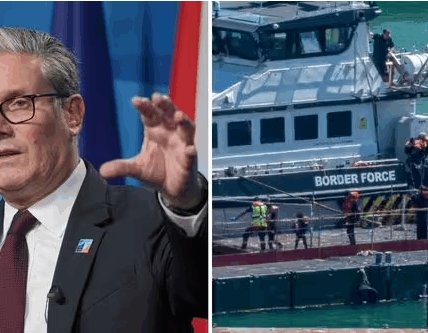The Prime Minister claimed his Brexit ‘reset’ would improve relations with the EU but British workers have been stabbed in the back by Brussels

Keir Starmer promised a new era of relations with the EU (Image: Getty)
Keir Starmer was branded “a total failure” as the European Union threatened 80,000 British jobs with plans for a massive tariff on steel. The Prime Minister proudly hailed a new deal with the EU in May, saying his so-called Brexit reset would “get the best for the British people”
But the claim lies in tatters today after the European Commission revealed plans to impose 50% tariffs on steel, double the current level of 25%, while cutting almost by half the amount of steel that can be sold without a tariff. The UK steel sector directly employs 33,700 people, and a further 42,000 work in the wider supply chain. But Gareth Stace, director-general at trade body UK Steel, said the EU betrayal was “perhaps the biggest crisis the UK steel industry has ever faced”.
Alasdair McDiarmid, assistant general secretary at the Community trade union, said: “Given that around 80% of the UK’s steel exports go to Europe, the new measures proposed by the EU represent an existential threat to our industry, as well as the thousands of jobs and communities it supports right across the country.”
Conservatives slammed Sir Keir for failing to keep his promises. Andrew Griffith MP, Shadow Business and Trade Secretary, said: “The government has no proper plan for steel. The threat of crippling 50 per cent EU tariffs is yet more evidence that Keir Starmer has totally failed the industry.
“He pledged to ‘give UK steel its future back’ and keep tariffs down. Instead, steel workers have been hung out to dry on the international stage, while facing higher costs at home thanks to Labour’s tax grabs and overregulation.
“Labour have broken every promise, betraying an industry that is so vital to our security. Ministers are flailing as that industry threatens to collapse around them.”
And Sir Keir’s union allies demanded he act now. Unite general secretary Sharon Graham said: “UK steel must be backed for the long term, the current piecemeal approach to our steel industry isn’t working.
“Without delay the UK must introduce strict rules to ensure that all UK infrastructure developments and all public sector projects must use domestically produced steel.
“This must be the first step in protecting a foundation industry which is critical for the economic success of our nation and vital for our national security.”
The EU tariff hike will come on top of new tariffs in the US levied by Donald Trump, which have already left the industry reeling.
The Prime Minister insisted his Government is “in discussions” with the European Union. As he travelled to India on a trade mission, Sir Keir said: “I think our position in relation to our steel industry is one of strong support as you saw from Scunthorpe and Port Talbot.
“In relation to the question of tariffs or other measures, as you’d expect, we are in discussions with the EU about this, as we’re in discussions with the US about it.
“So I’ll be able to tell you more in due course but we are in discussions, as you’d expect.”
Pressed on whether the UK was seeking exemptions, the Prime Minister said he would not go into details but that discussions were taking place with the EU and the US.
European Commission president Ursula von der Leyen said global overcapacity is damaging industry, adding that officials “need to act now”.
The commission has been under pressure from some member states which have struggled to compete with cheap imports from countries such as China.
The plan, which was presented to the European Parliament on Tuesday, is also intended to strengthen the traceability of steel.
It would replace the current steel safeguard measure, which is due to expire in June 2026.
The UK Steel trade association warned that access to Britain’s most important export market, which is currently the destination for 78% of British steel, could be “severely curtailed” by the move.
It called for the Government to negotiate preferential treatment for the UK and for Britain to have its own import quotas.
